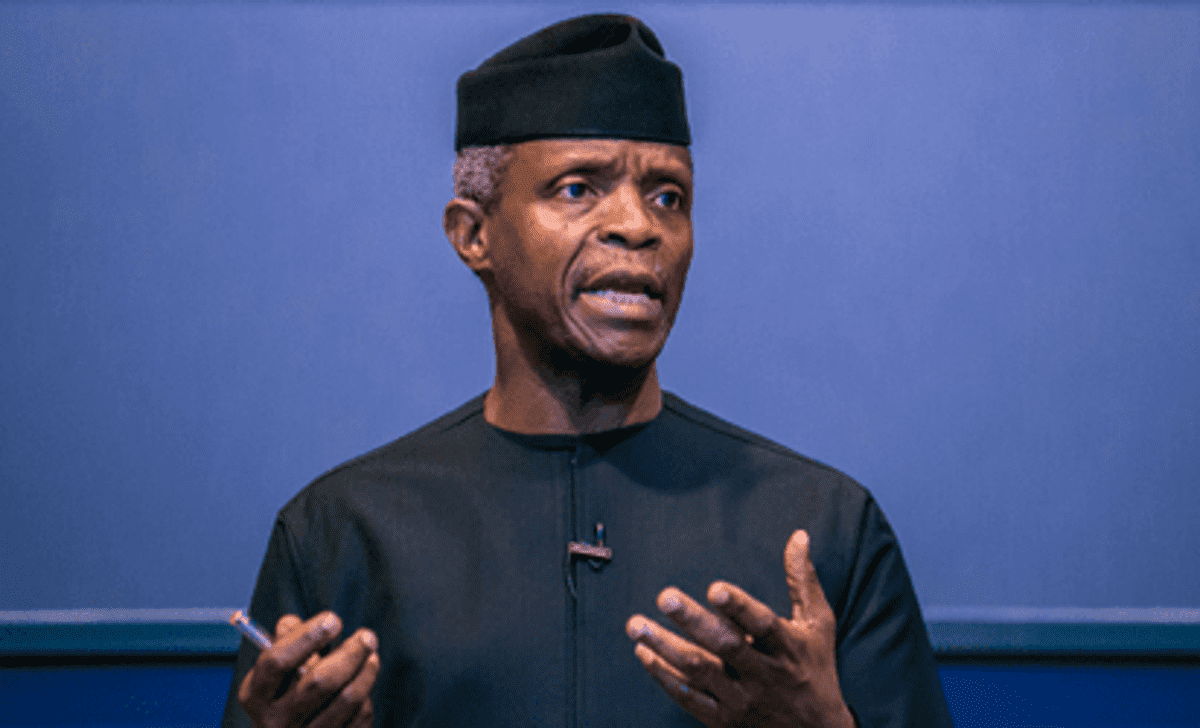Vice President Yemi Osinbajo says Sub-Saharan African will require annual investment of 40 billion dollars to implement a robust energy transition plan.
Osinbajo’s spokesman, Laolu Akande, in a statement on Tuesday in Abuja said that the vice president said this in his keynote speech at the virtual 7th Annual New York-based Columbia University Global Energy Summit.
The summit was organised by the Columbia Centre on Global Energy Policy.
This year’s edition focused on shaping current energy system, what is ahead for energy policy, energy markets, geopolitics, technology and efforts to reduce emissions.
Osinbajo said that while investments in fossils were being sustained in wealthier countries, banning gas investments in developing nations raised questions around equity, justice and inclusion.
He said that the questions were pertinent as the global community approached the Net-zero emission target of 2050.
Read Also: How To Protect Yourself Against ATM And POS Skimming Fraud
“Therefore, a just, equitable, and inclusive global energy transition especially for developing economies is an imperative.
“The global energy transition must be inclusive, equitable and just, taking into account the different realities of various economies and accommodating various pathways to net-zero by 2050.
“Nigeria and countries across Africa are committed to a net-zero future, especially given their vulnerability to the adverse effects of climate change.
“All have expressed commitment to their national development contributions under the Paris Agreement, however greater support in developing and implementing robust energy transition plans is needed.
“Clearly the continent will require an unprecedented scale of investments.
“An energy mix compatible with a 1.5°C pathway would require 40 billion dollars to flow into Sub-Saharan Africa annually; a fourfold increase compared to the $10 billion invested in 2018.”
The vice president said that a just energy transition for developing economies was central to the right to sustainable development and poverty eradication as enshrined in relevant global treaties including the Paris Agreement.
He regretted that wealthier nations and institutions were banning all public investments in fossil, including natural gas.
“Examples include the EU, UK and Denmark to name a few, as well as specific institutions such as the Swedfund from Sweden, CDC from the UK, the European Investment Bank, and the Investment Fund for Developing Countries from Denmark.
“Inclusive and equitable transition will also take into account the principles of common but differentiated responsibility and leaving no one behind that are enshrined into global treaties around sustainable development and climate action.
“It means building sustainability into our economic planning.
“So, we have developed an Economic Sustainability Plan, which includes our flagship “Solar Power Naija” programme aiming to electrify five million households and 25 million people by 2023 leveraging solar mini-grids and stand-alone systems.
“We believe in the potential of off-grid renewables to close the energy deficit in Nigeria and across Africa,” he said.
He said pathways to reaching net-zero by 2050 had to include, first, ending energy poverty by 2030.
Osinbajo warned that if energy access issues were left unaddressed, there would continue to be growing energy demand being addressed with high polluting and deforesting fuels such as diesel, kerosene, and firewood.
On her part, Mrs Damilola Ogunbiyi, the Special Representative of the UN Secretary-General for Sustainable Energy for All and Co-Chair of UN-Energy, said the funding of projects that would guarantee cleaner energy sources was critical to the attainment of net-zero by 2050.
Earlier in his opening remarks, Prof. Jason Bordoff, the Founding Director of the Centre on Global Energy Policy at Columbia University, said the annual gathering of energy experts was part of the contributions by the Centre in addressing pressing energy issues.
He expressed delight in having the vice president share perspectives at the 2021 summit.
Other participants at the summit included American energy expert and Vice Chairman of IHS Markit, Daniel Yergin, who moderated a fireside chat with Osinbajo after his keynote address.
Ms Caitlin Norfleet, the Event Manager of the Centre on Global Energy Policy, among others also featured.(NAN)

